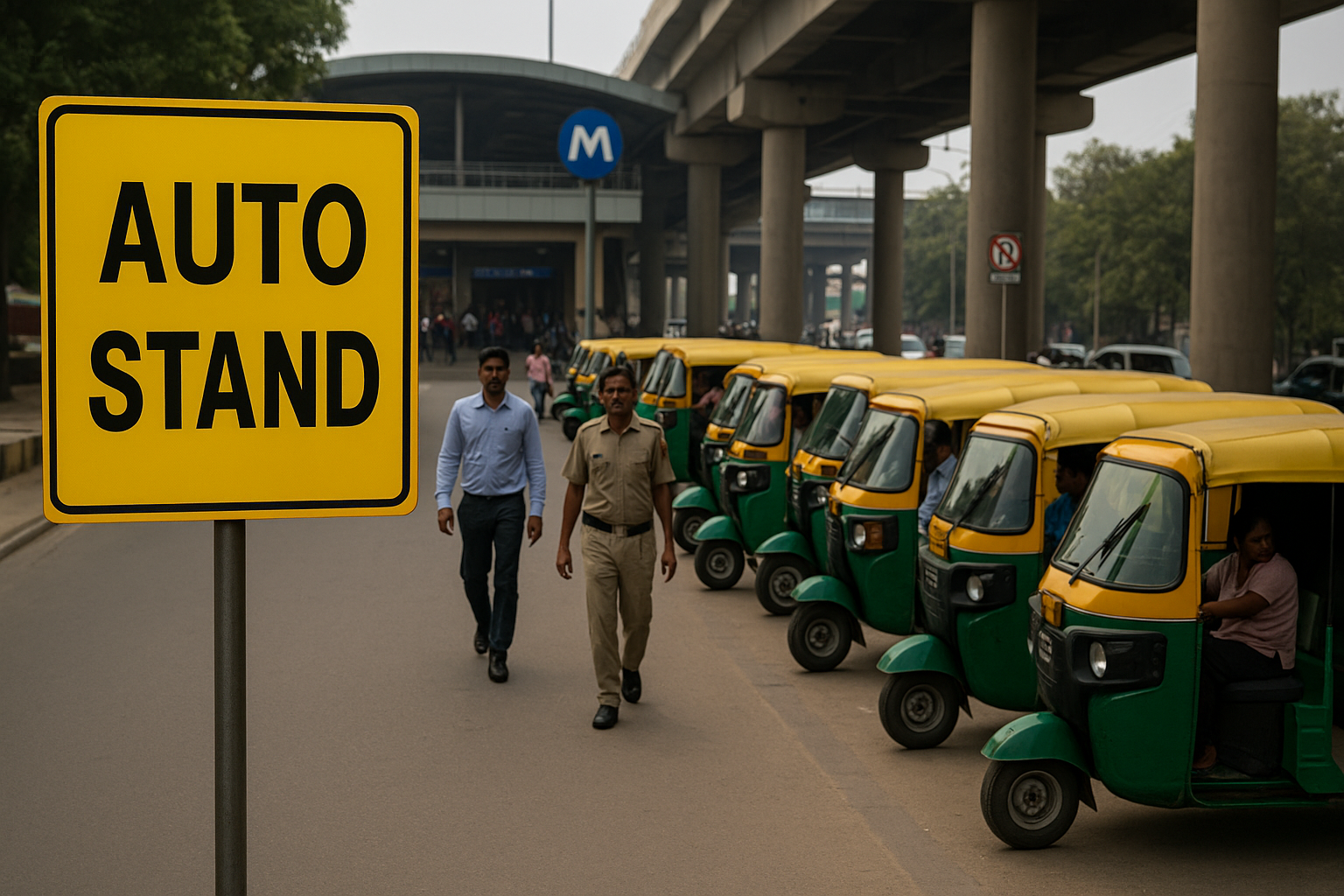As Noida rapidly evolves into a dense urban cluster with expanding metro connectivity, the city continues to grapple with the problem of unmanaged last-mile traffic. In a welcome move to address this, the Noida Authority has approved the creation of 100 new auto-rickshaw stands near metro stations and major commercial hubs. The initiative is aimed at resolving persistent congestion and improving the experience of thousands of daily commuters who rely on autos after stepping out of the metro.
Tackling the Last-Mile Crisis Plaguing Noida’s Metro Network
Metro stations in Noida — particularly high-traffic zones like Sector 52, Sector 15, Botanical Garden, Sector 18, and Noida City Centre — have long struggled with the lack of designated pick-up areas for auto-rickshaws. This has led to an unorganized sprawl of autos clogging road exits, blocking bus bays, and contributing to traffic snarls during peak hours.
Without fixed queues or designated bays, auto drivers often park wherever they find space — creating a safety hazard for pedestrians, hindering public buses, and leading to chaotic scenes during rush hours. Residents and office-goers have repeatedly flagged this as a key problem undermining the efficiency of Noida’s otherwise well-connected metro system.
The situation is especially pressing near metro stations that are gateways to dense residential zones, offices, and commercial areas. Without a reliable system for autos to operate in an organized fashion, many commuters end up waiting long or walking further to find rides — defeating the promise of smooth last-mile mobility.
100 New Auto Bays to Be Set Up Across Strategic Locations
Responding to this growing concern, the Noida Authority’s traffic cell has completed a ground-level survey and earmarked 100 high-priority locations for the construction of auto stands. These will be permanently demarcated zones, clearly marked with signages and lined up along logical commuter paths near metro exits.
While the complete list of stand locations hasn’t been released yet, officials confirmed that the initial focus will be on metro stations and commercial clusters that experience the highest auto activity and passenger footfall.
This infrastructure update will ensure:
- Orderly queuing and parking of autos
- Safe passenger pick-up/drop-off zones
- Easier regulation and monitoring by traffic authorities
- Improved traffic flow around metro stations
In addition, each designated auto stand may come equipped with surveillance coverage and support from traffic marshals or enforcement teams to prevent unauthorized parking or overcharging.
Reorganizing Urban Traffic, One Stand at a Time
The plan is part of a broader effort to reorganize urban transport nodes in Noida and align infrastructure with transit-oriented development (TOD) goals. By managing the flow of intermediate public transport like auto-rickshaws, city authorities aim to reduce private vehicle dependency and promote shared, eco-friendly commuting practices.
Officials have also hinted at future upgrades such as:
- Digital integration for real-time tracking of autos
- Rate cards to prevent overcharging
- Feedback systems for passengers
Such interventions are expected to improve not just mobility but also commuter trust in auto-rickshaw services — which continue to remain a vital part of the city’s informal transport network.
Focus Areas for the First Phase of Rollout
While full details are expected in the coming weeks, the first set of auto stands is likely to be established at:
- Botanical Garden Metro Station
- Sector 52 Metro
- Noida City Centre
- Sector 15, Sector 16, and Sector 18 hubs
- Film City and other commercial precincts
These areas currently suffer from unregulated parking, long wait times for commuters, and obstruction of major arterial roads due to informal auto queues.
Once the new stands are fully operational, they are expected to reduce roadside clutter, improve pedestrian safety, and ensure smoother traffic movement near metro corridors.
Building a Smarter Noida, One Last-Mile Fix at a Time
This move underscores a much-needed shift in urban planning — where authorities focus not just on large-scale infrastructure like expressways or metros but also on micro-mobility enablers that directly impact daily urban life.
By bringing structure to an otherwise chaotic part of the commute, the Noida Authority is addressing a problem that affects tens of thousands of residents and workers each day. If executed and monitored well, these 100 new auto stands could become a model for other NCR cities facing similar mobility challenges.
FAQs
Why is Noida building new auto stands near metro stations?
The Noida Authority is establishing 100 new auto-rickshaw stands to reduce traffic congestion, improve last-mile connectivity, and organize chaotic pick-up zones around metro stations and commercial areas.
Which metro stations will get the new auto stands first?
Stations with high footfall and traffic issues like Botanical Garden, Noida City Centre, Sector 18, and Sector 52 are expected to be part of the initial implementation phase.
How will these auto stands benefit commuters?
They will streamline passenger pick-up and drop-off, reduce random parking, enhance commuter safety, and ease vehicular movement near metro exits.
Will these auto stands be regulated?
Yes, Noida Authority plans to monitor the stands with proper signages and enforcement measures to prevent misuse and ensure organized operations.
Is there a plan to digitally integrate these auto stands in Noida?
Future proposals may include digital integration such as fare display systems, GPS tracking, or complaint registration features to make auto services more transparent and commuter-friendly.

